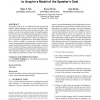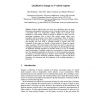259 search results - page 31 / 52 » Modalities Over Actions, I. Model Theory |
KCAP
2005
ACM
14 years 29 days ago
2005
ACM
An ultimate goal of AI is to build end-to-end systems that interpret natural language, reason over the resulting logical forms, and perform actions based on that reasoning. This r...
IJSE
2010
13 years 4 months ago
2010
Affective computing has proven to be a viable field of research comprised of a large number of multidisciplinary researchers resulting in work that is widely published. The majori...
GISCIENCE
2010
Springer
13 years 8 months ago
2010
Springer
Regions which evolve over time are a significant aspect of many phenomena in geographic information science. Examples include areas in which a measured value (e.g. temperature, sal...
ATAL
2011
Springer
12 years 7 months ago
2011
Springer
Computational models of motivation are tools that artificial agents can use to autonomously identify, prioritize, and select the goals they will pursue. Previous research has focu...
ICMI
2009
Springer
14 years 1 months ago
2009
Springer
In this paper, we investigate the multimodal nature of cell phone data in terms of discovering recurrent and rich patterns in people’s lives. We present a method that can discov...



